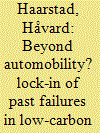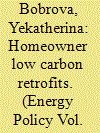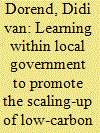|
|
|
Sort Order |
|
|
|
Items / Page
|
|
|
|
|
|
|
| Srl | Item |
| 1 |
ID:
186419


|
|
|
|
|
| Summary/Abstract |
Automobility, including the infrastructures, technologies and institutions that created high dependence on private car use, has led to significant environmental and climate problems and notably high carbon emissions. Now cities are attempting to move beyond this failed regime by experimenting with a range of different mobility innovations. In this paper, we examine whether emergent policy-led experiments and innovation processes in low-carbon mobility are learning from the past, or whether they are reproducing key elements of past policy failures. Through four case studies – Birmingham, Stavanger, Milton Keynes and Melbourne – we assess attempts to break out of high-carbon automobility through three key factors, namely diversification of travel options, a shift from individual to shared forms of mobility, and whether these aspects are implemented at scale. We find that while all cities show potential for diversification and sharing at scale, current modes of innovation exhibit features that may reproduce rather than reduce high-carbon automobility. Our analysis attributes this risk of continued failure to how policy-led experimentation and innovation are structured and themselves become locked in, thereby upholding the obdurate automobility regime.
|
|
|
|
|
|
|
|
|
|
|
|
|
|
|
|
| 2 |
ID:
180125


|
|
|
|
|
| Summary/Abstract |
The promotion of low-carbon home retrofit among UK homeowners is widely recognised as an important strategy to reduce operational energy use in dwellings and mitigate climate change. The related predominant UK policy approach is to address various market failures and develop the market for low-carbon retrofit and innovation. The current low uptake rate of low-carbon home retrofit suggests that a complementary policy approach is necessary to increase it and support households in their change towards low-carbon living. This paper uses an innovation framework to analyse retrofit as an innovation-decision process of several stages. Low-carbon technology is conceptualised at three nested levels: product, design option and technological system. A multiple-case study approach is used to analyse eight home retrofit cases from the SuperHomes network, that achieved significant carbon emission reductions through retrofit activities. Case analysis shows that: (i) homeowners collect information for each technology level through different communication channels, which are not interchangeable; (ii) homeowners develop a certain capacity to transform their environmental concerns into substantial retrofit activities; (iii) the positive retrofit experience of homeowners is crucial to develop such capacity and to convince others to retrofit their homes. These findings have important implications for energy policy on retrofit uptake in UK to support household transition to low-carbon living.
|
|
|
|
|
|
|
|
|
|
|
|
|
|
|
|
| 3 |
ID:
169854


|
|
|
|
|
| Summary/Abstract |
Local governments are experimenting with low-carbon initiatives (LCIs) to learn how the transition to low-carbon cities can be advanced. However, little is known about how local governments can capitalize on what has been learned and use it to accelerate scaling-up processes. This paper explores the complex relationship between LCIs and learning processes at the level of local government. The issue is examined through an explorative embedded case study in the City of Copenhagen, a sustainability frontrunner. The paper makes three contributions that enrich literature and practice concerning climate governance for sustainability transitions. First, it offers an overview of two types of knowledge that can be derived from LCIs to accelerate scaling-up processes: instrumental and transformative knowledge. Second, the paper provides a concrete overview of learning practices for governing learning processes within local government. Local governments can learn from LCIs through four categories of practice: experience accumulation, knowledge articulation, knowledge codification, and knowledge distribution. Finally, the paper offers an overview of explanatory factors related to the motivation, resources, and skills that influence a local government's capacity to learn from LCIs. The findings particularly highlight the importance of setting a mandate for experimenting with and evaluating LCIs.
|
|
|
|
|
|
|
|
|
|
|
|
|
|
|
|
| 4 |
ID:
177108


|
|
|
|
|
| Summary/Abstract |
To meet its rapidly growing electricity demand, Vietnam envisages ramping up its coal-fired generation capacity substantially. Realizing all coal-fired capacity additions that are planned globally would undermine international climate targets. This paper systematically analyzes the political economy shaping climate and energy policies in Vietnam, and finds that the country's coal developments are primarily motivated by political rather than economic considerations. Based on extensive data collected in semi-structured interviews, we identify the relevant actor groups and how their objectives influence energy policy formulation. This allows us to unravel the complex political channels that link Vietnam's move to coal to four overarching energy goals, which are, in turn, closely entangled with the Communist Party's strategy to legitimize its power: affordability, security of supply, promoting the domestic energy industry, and environmental sustainability. We show why Vietnam's tightly regulated electricity market, dominated by state-owned enterprises and vested interests, favors large-scale coal investments and weakens renewable energy regulations. While environmental and health concerns are becoming politically more relevant on the provincial level, silo mentalities within the administration and among international organizations result in weakly integrated environmental strategies. These in-depth insights from Vietnam have wider implications for understanding the adoption of coal in other country contexts.
|
|
|
|
|
|
|
|
|
|
|
|
|
|
|
|
|
|
|
|
|